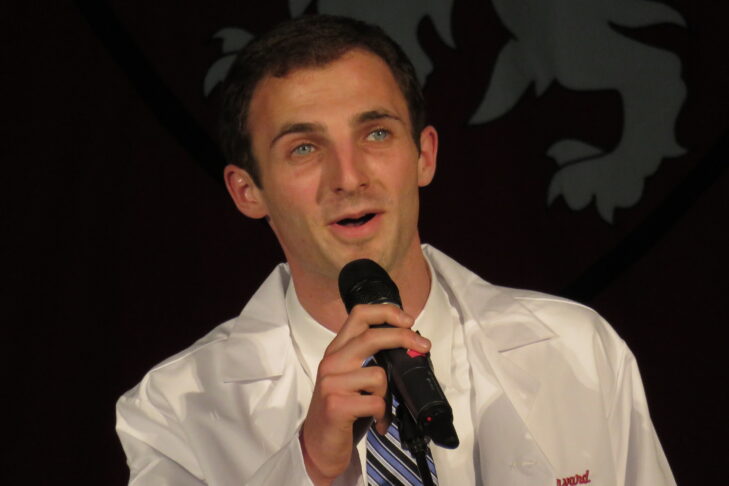When Adam Beckman, Ari Winograd, Esme Jacobson, Izzy Klein and Emma Rashes graduated from The Rashi School, they never imagined the world today, or that they would be involved in battling a terrifying global pandemic. But that’s exactly what they are doing, each in their own unique way.
Adam Beckman
The Rashi School ’08, Milton Academy ’12, Yale ’16, Harvard Medical School and Harvard Business School ’22
Adam, a third-year joint MD-MBA student at Harvard, and his medical student classmates have been out of the hospitals since the pandemic hit Boston. In mid-March, Adam helped health policy experts issue recommendations for health care and public health provisions of the federal stimulus bills, launching covid19bill.org (The New Yorker). He later worked with physicians to call attention to the lack of personal protective equipment (PPE) with #GetUsPPE, a viral hashtag and petition. That effort snowballed into GetUsPPE.org, a broader project to document the need for PPE and match groups that have PPE to those that still need it (CNN).
“Rashi classmates dove into helping wherever they can, which has been amazing to see,” said Beckman. He has joined several of his classmates on Friday night Shabbat Zoom calls they hosted.
Ari Winograd
The Rashi School ’03, Medfield High ’07, Clark ’11, Northeastern ’17
As the preparedness coordinator at the City of Worcester’s Emergency Management Division, Ari recently addressed a group representing hospitals, nonprofit agencies, the business community and municipal officials, presenting his innovative thoughts and plans to help mitigate the impact of COVID-19. Moreover, Ari presented a crash course on the continuity of operations.
Looking ahead, Ari outlined a plan for the Worcester community to continue to run its businesses and agencies during this unprecedented time. “Businesses and organizations should strive to determine what personnel and resources will be needed during the 30-day span,” said Winograd. “The most vital components of continuity of operations plans are determining stakeholders’ needs, and then, what essential functions and services require meeting their needs. The organization should then determine which personnel and what records are needed to provide services.” Winograd noted that that there will eventually be a recovery phase. “We need to remember that the plans should contemplate how to ramp up staffing and make sure supply chains remain intact.”
Esme Jacobson
The Rashi School ’06, Newton South High School ’10, University of Maryland College Park ’14, Lesley ’26
As a first-grade teacher at the Milton Gottesman Jewish Day School in Washington, D.C., Esme was thrown into an online teaching curriculum as a result of COVID-19. “While teaching online is not ideal,” said Jacobson, “I love connecting on Zoom with my students. Morning meeting is the highlight of my day!” Esme thinks it’s important to start each day “seeing” her students, greeting each other and hearing the kids share what’s on their minds or items from home.
She creates new Zoom lessons each day. “I pull up our math and reading curriculum online, share the screen with the kids and call on them to read and answer questions exactly like I would do in class,” said Esme. Read-aloud videos for the kids to watch are also an effective teaching tool, as well as coordinating specials for the kids so they can have science, art, PE, Israeli dance and music online too. “I love the school community, as it feels similar to the amazing community I had growing up at Rashi,” added Jacobson.
Izzy Klein
The Rashi School ’16, Newton South High School ‘20, American University ‘24
A current high school senior, Izzy created “Masks by Izzy,” a company that offers much-needed home-made masks online. Izzy has been hand-sewing these masks with a variety of color options, as well as sizing for men, women and children. All profits are going to The Greater Boston Food Bank. The masks can be worn alone or over an N-95. “I wanted to get involved in the community and do something to help prevent the virus from spreading during this unprecedented time,” said Klein. “Sewing masks is a way for me to make a difference.”
Emma Rashes
The Rashi School ’13, BB&N ’17, Stanford University ’21
As a college student, Emma Rashes is continuing to practice the social justice principles that have been integrated into her life since attending The Rashi School. Currently, Emma is taking part in the Silverlining Buddy System, an intergenerational response to combat isolation and loneliness in elders during the COVID-19 pandemic. Through twice-weekly phone calls, college and high school students connect with elders in the Greater Boston community, sharing stories, imparting wisdom and creating new connections.
“My phone buddy lives at 2Life Communities, is in her 90s and is a wonderful conversationalist,” said Emma. “I have enjoyed learning about her family, her personal life story and brightening her day.” She added, “I cherish the opportunity to make new connections and give back to the Greater Boston Jewish community while working remotely to continue to form Jewish community on my campus at Stanford.”
Social Justice Programming Instilled at a Young Age
For these alumni, the importance of social justice began the day they entered The Rashi School. From kindergarten throughout Grade 8, Rashi students learn the power of giving back to the community and that they can make a difference in the world, regardless of their age.
“When you integrate social justice learning and teaching, you show students how to think critically and put their gifts to work,” said Stephanie Rotsky, social justice coordinator at The Rashi School. “Seeing these alumni students step up during this most challenging time reinforces the fundamentals we teach every single day. I am so very proud of them.”
This post has been contributed by a third party. The opinions, facts and any media content are presented solely by the author, and JewishBoston assumes no responsibility for them. Want to add your voice to the conversation? Publish your own post here. MORE


